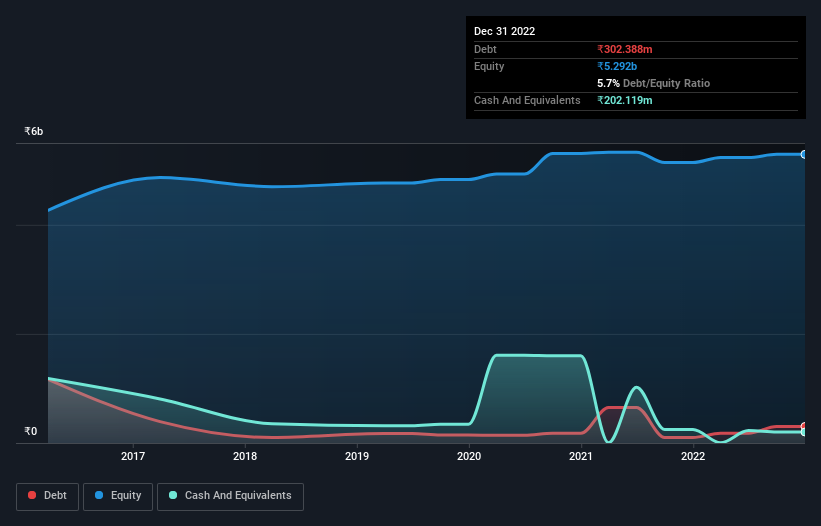Gujarat Apollo Industries (NSE:GUJAPOLLO) Is Making Moderate Use Of Debt
David Iben put it well when he said, 'Volatility is not a risk we care about. What we care about is avoiding the permanent loss of capital.' When we think about how risky a company is, we always like to look at its use of debt, since debt overload can lead to ruin. Importantly, Gujarat Apollo Industries Limited (NSE:GUJAPOLLO) does carry debt. But the real question is whether this debt is making the company risky.
When Is Debt A Problem?
Debt assists a business until the business has trouble paying it off, either with new capital or with free cash flow. In the worst case scenario, a company can go bankrupt if it cannot pay its creditors. However, a more frequent (but still costly) occurrence is where a company must issue shares at bargain-basement prices, permanently diluting shareholders, just to shore up its balance sheet. Of course, debt can be an important tool in businesses, particularly capital heavy businesses. The first thing to do when considering how much debt a business uses is to look at its cash and debt together.
View our latest analysis for Gujarat Apollo Industries
How Much Debt Does Gujarat Apollo Industries Carry?
The image below, which you can click on for greater detail, shows that at September 2022 Gujarat Apollo Industries had debt of ₹302.4m, up from ₹101.2m in one year. On the flip side, it has ₹202.1m in cash leading to net debt of about ₹100.3m.

How Healthy Is Gujarat Apollo Industries' Balance Sheet?
According to the last reported balance sheet, Gujarat Apollo Industries had liabilities of ₹466.5m due within 12 months, and liabilities of ₹122.0m due beyond 12 months. Offsetting this, it had ₹202.1m in cash and ₹1.83b in receivables that were due within 12 months. So it can boast ₹1.44b more liquid assets than total liabilities.
This surplus strongly suggests that Gujarat Apollo Industries has a rock-solid balance sheet (and the debt is of no concern whatsoever). Having regard to this fact, we think its balance sheet is as strong as an ox. When analysing debt levels, the balance sheet is the obvious place to start. But it is Gujarat Apollo Industries's earnings that will influence how the balance sheet holds up in the future. So when considering debt, it's definitely worth looking at the earnings trend. Click here for an interactive snapshot.
In the last year Gujarat Apollo Industries wasn't profitable at an EBIT level, but managed to grow its revenue by 49%, to ₹768m. With any luck the company will be able to grow its way to profitability.
Caveat Emptor
While we can certainly appreciate Gujarat Apollo Industries's revenue growth, its earnings before interest and tax (EBIT) loss is not ideal. Indeed, it lost ₹60m at the EBIT level. That said, we're impressed with the strong balance sheet liquidity. That should give the business time to grow its cashflow. The company is risky because it will grow into the future to get to profitability and free cash flow. The balance sheet is clearly the area to focus on when you are analysing debt. But ultimately, every company can contain risks that exist outside of the balance sheet. To that end, you should learn about the 3 warning signs we've spotted with Gujarat Apollo Industries (including 1 which can't be ignored) .
When all is said and done, sometimes its easier to focus on companies that don't even need debt. Readers can access a list of growth stocks with zero net debt 100% free, right now.
New: Manage All Your Stock Portfolios in One Place
We've created the ultimate portfolio companion for stock investors, and it's free.
• Connect an unlimited number of Portfolios and see your total in one currency
• Be alerted to new Warning Signs or Risks via email or mobile
• Track the Fair Value of your stocks
Have feedback on this article? Concerned about the content? Get in touch with us directly. Alternatively, email editorial-team (at) simplywallst.com.
This article by Simply Wall St is general in nature. We provide commentary based on historical data and analyst forecasts only using an unbiased methodology and our articles are not intended to be financial advice. It does not constitute a recommendation to buy or sell any stock, and does not take account of your objectives, or your financial situation. We aim to bring you long-term focused analysis driven by fundamental data. Note that our analysis may not factor in the latest price-sensitive company announcements or qualitative material. Simply Wall St has no position in any stocks mentioned.
About NSEI:GUJAPOLLO
Gujarat Apollo Industries
Manufactures and sells crushing and screening equipment for road and building construction, mining, and general infrastructure development in India and internationally.
Slight risk with mediocre balance sheet.
Market Insights
Community Narratives



